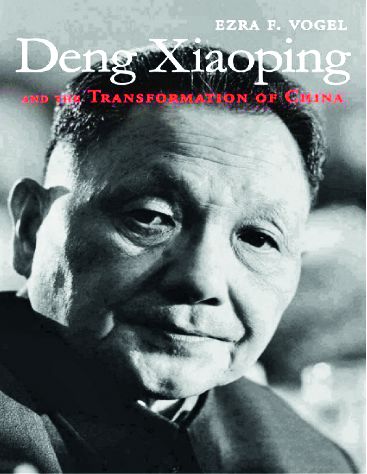
Deng Xiaoping and the Transformation of China
Author: Ezra F. Vogel
Paperback, 928 pages
Published by Belknap Press of Harvard University Press
THIS year marks the 40th anniversary of China’s reform and opening-up, and Deng Xiaoping is reputed as the chief architect of this grand undertaking. Therefore, foreign readers are recommended to read Deng Xiaoping and the Transformation of China written by professor Ezra F. Vogel, who is nicknamed “Mr. China” at Harvard University.
It took the author 10 years to complete the biography, which is a panoramic description of Deng’s rollercoaster life and his leading role in reform and opening-up to the outside world. Based on abundant historical documents, research both at home and abroad, archives, as well as exclusive interviews, Vogel, in his distinctive way, conducted an in-depth analysis of Deng’s personality and political career, as well as a comprehensive interpretation of that period of history.
Personages such as Chairman Mao Zedong, Premier Zhou Enlai, and Vice Premier Chen Yun, and their relations with Deng are expounded upon, together with major events and decisions including the Third Plenary Session of the CPC’s 11th Central Committee, establishment of China-U.S. diplomatic relations, tentative political reform, construction of special economic zones, the policy of one country and two systems, and Deng’s southern tour in 1992.
The book’s six parts encompass 23 chapters, from Deng’s birth in 1904 to his southern journey in 1992, a retrospect on his life in chronological order, including Life Experience (1904-1969), Banishment and Return (1969-1977), Ushering in the Times of Deng (1978-1980), After Reform and Opening-Up (1978-1989), Challenges in the Times of Deng (1989-1992), and Deng’s Historic Status (China Transformed).
Ezra F. Vogel, a Henry Ford II Professor of the Social Sciences Emeritus at Harvard University, was once the director of the Fairbank Center for East Asian Research. As a scholar whose research concentrated on Japan and China, he has written multiple works including Japan as Number One: Lessons for America; Canton under Communism: Programs and Politics in a Provincial Capital, 1949-1968; and One Step Ahead in China: Guangdong Under Reform.
In September 2011, Harvard University Press published Deng Xiaoping and the Transformation of China, which instantly became a “must read on contemporary China,” honored in the short list of American National Book Awards, a 2012 Lionel Gelber Prize winner, and was recommended by The Economist and the New York Times, as well as by former U.S. presidents Jimmy Carter and Bill Clinton, former U.S. National Security Advisor Zbigniew Brzezinski, and Bill Gates.
“He’s small, tough, intelligent, frank, courageous, personable, self-assured and friendly. It’s a pleasure for me to negotiate with him.” Former U.S. President Jimmy Carter recalled of Deng, and acclaimed that the book was an impressive biography. He regarded Deng as one of the most important figures of the 20th century, who pushed forward the transformation of China’s economy, politics, and society, as well as the establishment of diplomatic relations between the U.S. and China, a great achievement for both nations.
Facts are the footstone of Vogel’s research and writings on Deng Xiaoping, who left behind neither private documents, nor notes or diaries. Deng never revealed his major decisions to the public; and no one knows what Deng was thinking on. Vogel therefore did a solid job, reading books, researching sources, and interviewing witnesses and insiders. He exchanged views with Chinese and foreign top leaders, met with Deng’s relatives and persons who held different positions, as well as some intellectuals. He visited Ruijin County in Jiangxi Province where Deng served as the County Party Secretary, to Taihang Mountain where Deng established the anti-Japanese base, and also to Deng’s hometown in Guang’an of Sichuan Province. In addition, he managed to discuss with foreign statesmen who met or negotiated with Deng, including the first Prime Minister of Singapore Lee Kuan Yew, former Governor of Hong Kong Sir Murray McLehose and former U.S. Secretary of State Henry Alfred Kissinger.
In the 1980s, Vogel stayed in Guangdong Province where Deng started the economic reform. During the seven or eight months, Vogel chatted with directors from county-level economic committees to know every detail of the reform. Based on his research and observation, the author formed a distinctive understanding on contemporary China.
Vogel predicts that China’s GDP will surpass that of the U.S. in 10 or 20 years. The U.S.-China relationship is to become the most important relationship in the world, which urges the two big nations to seek peace, avoid conflict, and enhance mutual understanding. If an American wants to know China, they must study the history of reform and opening-up since China has taken on tremendous changes in the course.
Vogel says in the preface that the book is based on Deng’s words and deeds and he cannot disguise his admiration for the late Chinese leader. Deng has exerted a huge impact on the world, and completely changed the direction of his nation after suffering the “great leap forward” (1958-1960) and the “cultural revolution” (1966-1976). The author hopes that Chinese people regard the book as a serious study on China’s reform and opening-up.
For an octogenarian author, a decade of time and effort is neither a trivial nor an easy investment. The book merits a thorough reading considering the impressive amount of attention to detail, research, and monumental efforts that went into it.
